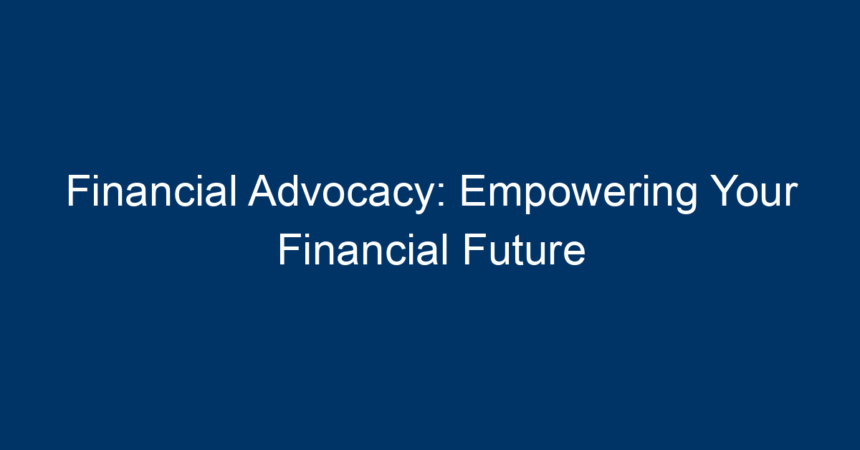In today’s dynamic economic landscape, individuals find themselves facing numerous financial challenges. From rising living costs to unpredictable market shifts, navigating your financial future can feel overwhelming. This is where financial advocacy comes into play. By understanding the principles of financial advocacy, you can take control of your finances, make informed decisions, and secure a prosperous future. In this article, we will explore the meaning of financial advocacy, its importance, and actionable strategies to empower your financial journey.
What is Financial Advocacy?
Financial advocacy involves the support and representation of individuals in navigating their financial rights and responsibilities. It empowers individuals by providing information, resources, and guidance necessary for making informed decisions that affect their economic well-being. Whether it’s managing debts, planning for retirement, or creating a budget, financial advocacy aims to uplift individuals by helping them understand their options and potential strategies.
The Role of Financial Advocates
Financial advocates can be professionals, such as financial planners and educators, or community organizations dedicated to promoting financial literacy. Their role includes:
- Educating Clients: Advocates provide essential knowledge about personal finance, helping individuals to understand complex financial concepts.
- Resource Identification: They help people identify resources available to them, including loan programs, grants, and budgeting tools.
- Representation: Financial advocates can act on behalf of their clients in dealings with financial institutions or during financial disputes.
By being proactive, financial advocates nurture a supportive environment where individuals can learn and grow.
The Importance of Financial Advocacy
As financial landscapes evolve, so too do the challenges individuals face. Here’s why financial advocacy is crucial:
1. Promotes Financial Literacy
Financial literacy is the bedrock of sound financial decision-making. Financial advocacy educates individuals about topics such as budgeting, saving, investment, debt management, and credit scores. By enhancing financial knowledge, individuals can make better choices that positively influence their financial futures.
2. Builds Confidence
Understanding one’s financial situation fosters confidence. When individuals are equipped with the right tools and knowledge, they’re empowered to take charge of their finances. This empowerment can lead to transformative changes, such as reducing debt or increasing savings.
3. Facilitates Access to Resources
Financial advocates help clients discover various resources tailored to their needs. Whether it’s scholarships, financial aid, or debt relief options, understanding what’s available can significantly alter an individual’s economic trajectory.
4. Supports Goal Setting
Financial advocates assist individuals in setting and achieving their financial goals. Whether it’s buying a house, funding education, or planning for retirement, setting clear objectives is essential for success. Advocates can guide individuals through the creation of actionable plans to reach these milestones.
| Benefit of Financial Advocacy | Description |
|---|---|
| Education | Knowledge gap bridged through effective learning. |
| Confidence | Increased self-efficacy in managing finances. |
| Access | Finding and utilizing available resources. |
| Goal Setting | Clear roadmap to financial objectives. |
Key Components of Financial Advocacy
Understanding the core components of financial advocacy can help individuals leverage its potential. These components include:
1. Financial Education Programs
Participating in workshops or seminars dedicated to financial topics is essential. Consider joining local financial education programs or online courses that cover areas like investing basics, retirement planning, and budgeting strategies.
2. One-on-One Financial Counseling
Personalized counseling can make a significant difference. Many organizations offer free or low-cost counseling, where trained advocates provide tailored advice and strategies to address specific financial situations.
3. Networking Opportunities
Building a supportive network is invaluable. Engaging with like-minded individuals through community groups, social media, or local meetups can foster shared learning experiences and create lasting support systems.
4. Accessible Tools and Resources
Take advantage of budgeting tools, investment platforms, and financial literacy resources. With technology at our fingertips, apps and websites designed for personal finance management can simplify the process and aid individuals in tracking their progress.
Actionable Strategies for Financial Advocacy
To fully empower your financial future, consider the following strategies rooted in financial advocacy:
Establish Clear Financial Goals
Begin by clearly defining your financial goals. Write them down, prioritize them, and create a timeline. Whether you aim to save for a vacation or pay off debt, concrete goals provide direction and motivation.
Create a Budget
Developing a budget is essential for effective financial management. Track your income and expenses to identify areas where you can cut costs. By maintaining oversight of your financial habits, you position yourself to make informed adjustments as needed.
Educate Yourself Continuously
Stay informed about personal finance topics by reading books, taking courses, or subscribing to financial podcasts and blogs. Knowledge is power, and the more you learn, the better equipped you will be to handle financial challenges.
Utilize Technology
Leverage financial apps and tools designed to facilitate budgeting, saving, and investing. Resources like Mint, YNAB (You Need A Budget), and Robinhood offer user-friendly interfaces to manage finances effectively.
Seek Professional Guidance
Don’t hesitate to consult financial professionals who can provide personalized advice. Whether it’s a financial planner or an attorney, expert guidance can illuminate paths that may not be immediately apparent and offer reassurance during challenging times.
Engage with Community Resources
Explore local community resources that provide financial education or counseling services. Many non-profits, libraries, and governmental organizations offer workshops or resources aimed at improving financial literacy.
Overcoming Common Financial Challenges
Despite the proactive steps taken, challenges may still arise. Here’s how to tackle common financial hurdles:
1. Student Debt
For many, student loans represent a significant financial burden. Explore options for income-driven repayment plans, loan forgiveness programs, or refinancing options. Financial advocates can provide insight into managing student debt effectively.
2. Unexpected Expenses
Life is full of surprises, and unexpected expenses can derail budgets. Create an emergency fund to provide a financial cushion. Aim to save three to six months’ worth of living expenses to navigate unforeseen costs.
3. Inadequate Retirement Savings
Many individuals forget to prioritize retirement savings. Start by contributing to employer-sponsored retirement plans, especially if there’s a matching contribution. Explore individual retirement accounts (IRAs) and automation tools to ensure consistent contributions.
4. Credit Card Debt
Credit card debt can be overwhelming. Focus on creating a payment plan to reduce balances and prevent accruing further debt. Utilize the snowball or avalanche methods to tackle debts systematically.
5. Lack of Insurance
Ensure that you and your loved ones are protected from unforeseen circumstances by having adequate insurance coverage. Review health, life, and property insurance policies periodically to ensure they meet your needs.
Conclusion: Take Charge of Your Financial Future
In a world where financial uncertainty is often the norm, financial advocacy serves as a beacon of hope. By leveraging financial education, utilizing professional guidance, and implementing effective strategies, individuals can take charge of their economic destinies. Remember, the journey to financial empowerment is continuous and requires dedication and resilience.
Start today by implementing one actionable insight from this article. Understand that every small step you take contributes to a healthier financial future. Embrace financial advocacy as your ally, and empower yourself to thrive in your financial journey. Whether you’re tackling debt, planning for retirement, or simply seeking to improve your financial literacy, the tools and resources are available to secure your tomorrow.
Empower your financial future—begin your journey of financial advocacy now!




